FIND LATERAL AND TOTAL SURFACE AREA OF RECTANGULAR PRISM
Subscribe to our ▶️ YouTube channel 🔴 for the latest videos, updates, and tips.
In geometry, a rectangular prism can be defined as a 3-dimensional solid shape which has six faces that are rectangles. A rectangular prism is also a cuboid.
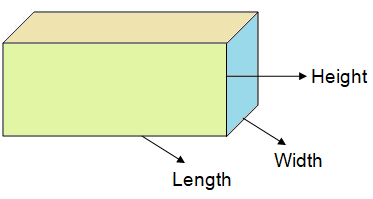
What is lateral surface area ?
The lateral surface of an object is all of the sides of the object, excluding its base and top. The lateral surface area is the area of the lateral surface.
What is total surface area ?
The total surface of an object is all of the sides of the object, including its base and top.
Lateral surface area of rectangular prism = 2h(l + w)
Total surface area of rectangular prism = 2(lw + wh + hl)
Find the
(i) Lateral surface area and
(ii) Total surface area of the following rectangular prism.
Problem 1 :
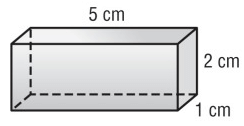
Solution :
From the prism,
l = 5 cm, w = 1 cm and h = 2 cm
(i) Lateral surface area = 2h (l +w)
= 2(2)(5 + 1)
= 4(6)
= 24 cm2
(ii) Total surface area of the rectangular prism
= 2(lw + lh + wh)
= 2 [(5 × 1) + (5 × 2) + (1 × 2)]
= 2(5 + 10 + 2)
= 2(17)
= 34 cm²
Problem 2 :
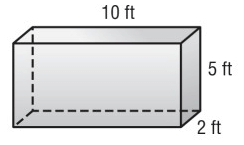
Solution :
From the prism,
l = 10 ft, w = 2 ft and h = 5 ft
(i) Lateral surface area = 2h (l +w)
= 2(5)(10 + 2)
= 10(12)
= 120 ft2
(ii) Total surface area of the rectangular prism
= 2(lw + lh + wh)
= 2 [(10 × 2) + (10 × 5) + (2 × 5)]
= 2(20 + 50 + 10)
= 2(80)
= 160 ft²
Problem 3 :
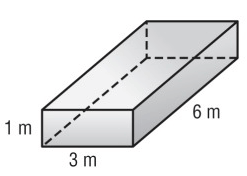
Solution :
From the prism,
l = 6 m, w = 3 m and h = 1 m
(i) Lateral surface area = 2h (l +w)
= 2(1)(6 + 3)
= 2(9)
= 18 m2
(ii) Total surface area of the rectangular prism
= 2(lw + lh + wh)
= 2 [(3 × 1) + (3 × 6) + (1 × 6)]
= 2(3 + 18 + 6)
= 2(27)
= 54 m²
Problem 4 :
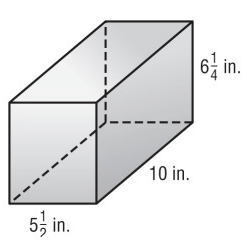
Solution :
From the prism,
l = 10 in, w = 11/2 in and h = 25/4 in
(i) Lateral surface area = 2h (l + w)
= 2(25/4)(10 + 11/2)
= (25/2)(31/2)
= 193.75 ft2
(ii) Total surface area of the rectangular prism
= 2(lw + lh + wh)
= 2 [(11/2 × 10) + (25/4 × 11/2) + (10 × 25/4)]
= 2(55 + 34.375 + 62.5)
= 2(151.87)
= 303.75 ft²
Problem 5 :
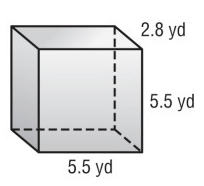
Solution :
From the prism,
l = 5.5 yd in, w = 2.8 yd and h = 5.5 yd
(i) Lateral surface area = 2h (l + w)
= 2(5.5)(5.5 + 2.8)
= 11(8.3)
= 91.3 yd2
(ii) Total surface area of the rectangular prism
= 2(lw + lh + wh)
= 2 [(5.5 × 2.8) + (5.5 × 5.5) + (2.8 × 5.5)]
= 2(15.4+ 30.25 + 15.4)
= 2(61.05)
= 122.1 yd²
Problem 6 :
A rectangular room is 12 feet by 21 feet. The walls are 8 feet tall. Paint is sold in one gallon containers. If a gallon of paint covers 450 sqaure feet, how many gallons of paint should poloma buy to paint the walls of the room ?
Solution :
Dimensions of room :
Length = 12 feet, width = 21 feet and height = 8 feet
Number of walls = 4
Surface area of rectangular room = 2h(l + w)
= 2 x 8 x (12 + 21)
= 16 x 33
= 528 square feet
1 gallon of paint will cover 450 square feet
Number of gallons = 528/450
= 1.17
Approximately 2 gallons of paint is needed.
Problem 7 :
The scale factor of prism X to prism Y is 2/3. What is the ratio of the surface area of prism X to the surface area of prism Y.
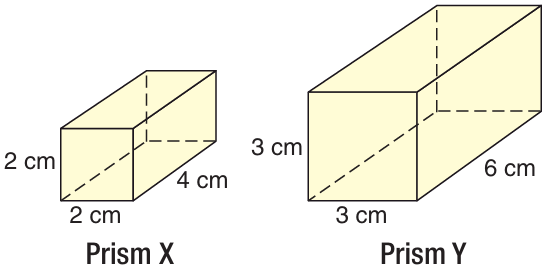
Solution :
Dimension of prism X :
length = 4 cm, width = 2 cm and height = 2 cm
Surface of prims X = 2h(l + w)
= 2 x 2 (4 + 2)
= 4 x 6
= 24 cm2
Dimension of prism Y :
length = 6 cm, width = 3 cm and height = 3 cm
Surface of prims X = 2h(l + w)
= 2 x 3 (3 + 6)
= 6 x 9
= 54 cm2
Ratio between surface area of prism X to prism Y :
= 24/54
= 4/9
So, the required ratio is 4 : 9.
Problem 8 :
The greater the surface area of an ice block, the faster it will melt. Which will melt faster, the bigger block or the three smaller blocks? Explain your reasoning.
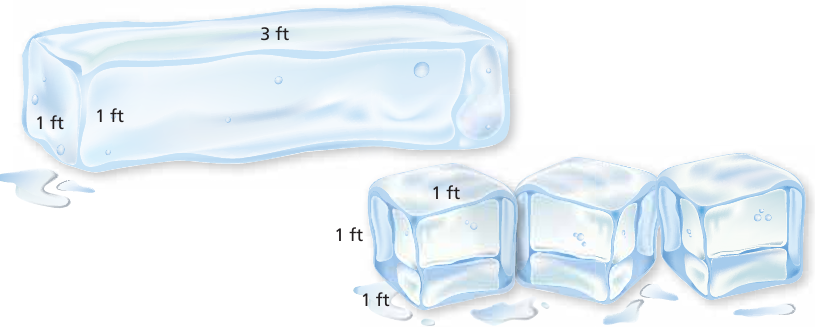
Solution :
Surface area of rectangular prism :
length = 3 ft, width = 1 ft and height = 1 ft
Total surface area = 2(lw + wh + hl)
= 2(3⋅1 + 1⋅1 + 1⋅3)
= 2(3 + 1 + 3)
= 2(7)
= 14 square feet
Surface area of 3 cubes :
Side length = 1 ft
Total surface area = 4a2
= 3(4⋅12)
= 3(4)
= 12 square feet
So, 3 small cubes will melt faster.
Subscribe to our ▶️ YouTube channel 🔴 for the latest videos, updates, and tips.
Recent Articles
-
Finding Range of Values Inequality Problems
May 21, 24 08:51 PM
Finding Range of Values Inequality Problems -
Solving Two Step Inequality Word Problems
May 21, 24 08:51 AM
Solving Two Step Inequality Word Problems -
Exponential Function Context and Data Modeling
May 20, 24 10:45 PM
Exponential Function Context and Data Modeling